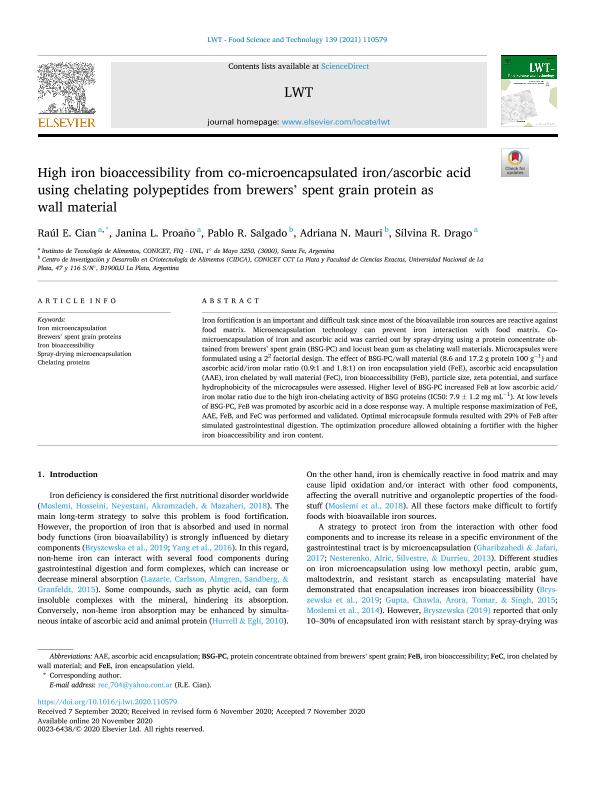Artículo
High iron bioaccessibility from co-microencapsulated iron/ascorbic acid using chelating polypeptides from brewers’ spent grain protein as wall material
Cian, Raúl Esteban ; Proaño Miniguano, Janina Lissette
; Proaño Miniguano, Janina Lissette ; Salgado, Pablo Rodrigo
; Salgado, Pablo Rodrigo ; Mauri, Adriana Noemi
; Mauri, Adriana Noemi ; Drago, Silvina Rosa
; Drago, Silvina Rosa
 ; Proaño Miniguano, Janina Lissette
; Proaño Miniguano, Janina Lissette ; Salgado, Pablo Rodrigo
; Salgado, Pablo Rodrigo ; Mauri, Adriana Noemi
; Mauri, Adriana Noemi ; Drago, Silvina Rosa
; Drago, Silvina Rosa
Fecha de publicación:
03/2021
Editorial:
Academic Press Inc Elsevier Science
Revista:
LWT - Food Science and Technology
ISSN:
0023-6438
Idioma:
Inglés
Tipo de recurso:
Artículo publicado
Clasificación temática:
Resumen
Iron fortification is an important and difficult task since most of the bioavailable iron sources are reactive against food matrix. Microencapsulation technology can prevent iron interaction with food matrix. Co-microencapsulation of iron and ascorbic acid was carried out by spray-drying using a protein concentrate obtained from brewers’ spent grain (BSG-PC) and locust bean gum as chelating wall materials. Microcapsules were formulated using a 22 factorial design. The effect of BSG-PC/wall material (8.6 and 17.2 g protein 100 g−1) and ascorbic acid/iron molar ratio (0.9:1 and 1.8:1) on iron encapsulation yield (FeE), ascorbic acid encapsulation (AAE), iron chelated by wall material (FeC), iron bioaccessibility (FeB), particle size, zeta potential, and surface hydrophobicity of the microcapsules were assessed. Higher level of BSG-PC increased FeB at low ascorbic acid/iron molar ratio due to the high iron-chelating activity of BSG proteins (IC50: 7.9 ± 1.2 mg mL−1). At low levels of BSG-PC, FeB was promoted by ascorbic acid in a dose response way. A multiple response maximization of FeE, AAE, FeB, and FeC was performed and validated. Optimal microcapsule formula resulted with 29% of FeB after simulated gastrointestinal digestion. The optimization procedure allowed obtaining a fortifier with the higher iron bioaccessibility and iron content.
Archivos asociados
Licencia
Identificadores
Colecciones
Articulos(CCT - SANTA FE)
Articulos de CTRO.CIENTIFICO TECNOL.CONICET - SANTA FE
Articulos de CTRO.CIENTIFICO TECNOL.CONICET - SANTA FE
Articulos(CIDCA)
Articulos de CENTRO DE INV EN CRIOTECNOLOGIA DE ALIMENTOS (I)
Articulos de CENTRO DE INV EN CRIOTECNOLOGIA DE ALIMENTOS (I)
Citación
Cian, Raúl Esteban; Proaño Miniguano, Janina Lissette; Salgado, Pablo Rodrigo; Mauri, Adriana Noemi; Drago, Silvina Rosa; High iron bioaccessibility from co-microencapsulated iron/ascorbic acid using chelating polypeptides from brewers’ spent grain protein as wall material; Academic Press Inc Elsevier Science; LWT - Food Science and Technology; 139; 3-2021; 1-8
Compartir
Altmétricas



